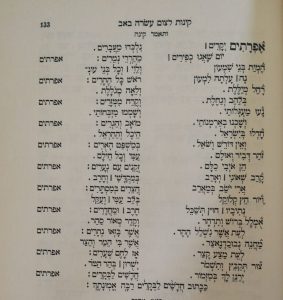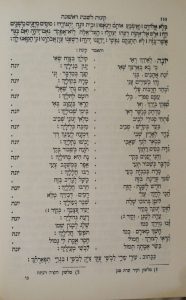 I know. I know. It’s not even Shavuot and here I am talking about lamentations for the month of Av. But I can’t stop listening to these snippets I received from Hazzan Rotem Cohen. He recorded the introductory words of a well-known Karaite lamentation for me in two renditions: once with the Egyptian tune and once with the Crimean tune. Today, I want to see if you can identify which is which.
I know. I know. It’s not even Shavuot and here I am talking about lamentations for the month of Av. But I can’t stop listening to these snippets I received from Hazzan Rotem Cohen. He recorded the introductory words of a well-known Karaite lamentation for me in two renditions: once with the Egyptian tune and once with the Crimean tune. Today, I want to see if you can identify which is which.
For those of you who just want to try your ear at spotting a melody and be on with your lives, I don’t blame you. Listen to these two clips of Yona Le’edech Re’i and then tell vote which one is the Crimean melody and which one is the Egyptian melody.
Melody A
Melody B
Now let’s test your musical senses.
Now that you’ve voted, I am actually going to make you read the rest of the story, to find out if you were right.
And now, the rest of the story.
So, as many of you know, I am working on a database of Karaite texts – something like Sefaria, but nothing nearly as polished. In the course of that work, I ended up speaking to Dr. Avi Shmidman, one of the driving forces behind Dicta’s awesome digital humanities initiatives. (Seriously, check out their pasuk finder and their vocalizer.)
In any event, Dr. Shmidman’s background (aside from computer programming) is in Medieval Hebrew Poetry. And every year he leads a class on lamentations at the Kotel on the Ninth of Av, the date on which Rabbanite Jews mourn the destruction of the Temple. Well, this past year, the Ninth of Av fell on Shabbat, and when that happens, they push the mourning for the Temple to the Tenth of Av.
Without getting into all the details why, Karaites always mourn for the destruction of the Temple on the Seventh of Av and the Tenth of Av (and not the Ninth of Av). So, given that the Rabbanite observance of the Ninth of Av was pushed to the Tenth of Av, Dr. Shmidman seized the opportunity to teach Karaite poetry, which is recited on the 10th of Av.
The poem that he focused on was Efratim Yekarim, by the Karaite Sage Aaron ben Joseph, a prolific poet and compiler of the Karaite siddur in current use.
Now to be honest, I have never recited Efratim Yekarim, so I didn’t know the tune. I reached out to Hazzan Rotem Cohen, and he recorded the first few lines of Efratim Yekarim for us here.
I never asked, but I am pretty sure he recorded this from memory on the way back from a Yom Ha’atzmaut party.
The words to Efratim Yekarim are at the bottom of this article.
In any event, I shared all this with Nir Nissim, who is volunteering his weekends with our community in Daly City. He said he loves Efratim Yekarim, and added that there was another song that he also loved. It was late – 12:30 a.m. on a Sunday morning – and the words weren’t coming to him immediately. So he hummed the tune for me in a recording for Hazzan Rotem.
Hazzan Rotem, being the most gracious person in the world with his time and voice, immediately – from memory – sent back the following recording.
So, Hazzan Rotem could name that tune. The song is called Yona Le’edech Re’i.
And there you have it, the first melody in the recording is the Egyptian melody. This is the melody I labeled above as Melody B. The second melody is the Crimean melody. This is the melody I labeled above as Melody A.
Three notes here:
- First Hazzan Rotem uses the Hebrew term חצי האי קרים / Hatzi Ha’i Krim the Hebrew name for Crimea (more literally, “The Crimean Peninsula”.)
- Second, Hazzan Rotem tells us that the Crimean melody is actually sung more in Israel. This is despite the fact that 99% of the Karaites in Israel are of Egyptian descent. As Hazzan Rotem suggests, the person who knows the Crimean Karaite melodies the best is Rabbi Avraham Kefeli – who is himself of Crimean Karaite descent.
- Third, Yona Le’edech Re’i appears two places in the Vilna Siddur: once in Volume 1, and is listed as a song recited on the 10th of Av; and once in Volume 4, and is listed as a song recited upon the passing away of a woman. The lyrics of the song indicate it was originally connected to Av.
The Hebrew words to Yona Le’edech Re’i are at the bottom of this article. But for those interested, the words that Hazzan Rotem sings are translated roughly as follows:
O Dove, look at your doom.
Lift up your voice in a screech.
For devastation has come into your land;
grief into your joy.
(Credit goes to James Walker and Nir Nissim for helping me translate this.)
* * *
Today is the second day of the seventh week of the seventh week. Today is the 44th day of the counting of 50 days from the morrow of the Sabbath.
Here are the lyrics for Efratim Yekarim.
Here are the lyrics for Yona Le’edech Re’i.




Shalom Shawn. The play button is non functioning for Melody B. Please check it. Thank you.
Seems to be working.
The repeated lower in the articles second set (pair) of melodies work fine. It was the Melody B before the vote was taken that I could not get to play.
As long as we have no ability to worship on/at Har haBayit — but especially with the Israeli apartheid system against Jews in place there — I fervently opine that using the sadder Crimean tune is more appropriate and therefore right on the mark.
Toda
Aharon
Ancientfineart12@gmail.com
Met you today at Shuell
7074094433
Shalom, you should open synagogues in South America the truth here there are many people who want to return to torah and Judaism of any kind that opens the doors and allows him to study torah. Messianics are the ones who take advantage of that thirst for torah that exists in South America. It is just an advice. Chabad is doing it but unfortunately they accept very few.
I am South American, I think a YouTube channel in Spanish would also be good. I have noticed that there is only in English just like the web pages. To read this post I had to go to the Google translator. Chabad has many websites in Spanish and they have flooded the websites of South America with Chassidism especially in Argentina.
Best regards.